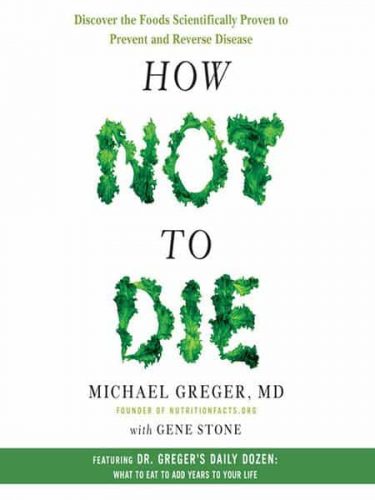
Everyone knows that we should eat 5 fruits / vegetables a day to protect our health – but that’s not true.
The real figure, arrived at through considerable research, is 9, but public health messengers decided that the public didn’t want to hear that – it wasn’t a figure they would consider realistic or achievable – so public health messaging focuses on getting our ‘five a day’.
Of course, while this decision may be made with the best of intentions (or it may be something to do with the relative profit margins available in promoting carrots over cakes!), we all know that when ‘advised’ to reach a target of 5 we may fail to get there, which, of course, is what happens. So wouldn’t it be better to know that actually we should be aiming for 9 items of fruit / veg consumption a day? Dr Greger thinks so and in this book he sets out to explain what research suggests we should be eating to avoid succumbing to the most common causes of death.
What’s it about?
Dr Greger believes that we should be given accurate information uncovered through the latest research into health and nutrition so that we can all make knowledgeable decisions about our diet and therefore our health, since the two are inextricable, rather than being fobbed off with a version of the truth that the government believes we will tolerate – and that will allow the food ‘industry’ to continue to sell us food that actively harms us.
‘Most deaths in the United States are preventable, and they are related to what we eat. Our diet is the number-one cause of premature death and the number-one cause of disability.’
In part one, each chapter explores the research into nutrition surrounding one of the top killers in (industrialised, Western) societies, including but not limited to heart disease, high blood pressure and various cancers. Common wisdom posits that increased deaths from these diseases are because we are living longer and our bodies simply get old and work less effectively, but Dr Greger pinpoints the research which shows that, actually, with the right diet, these diseases are both avoidable and reversible. This research is supplemented with anecdotes from people who have used Dr Greger’s website, NutritionFacts.Org to turn their diet around and have reaped the benefits.
In part two, he outlines his own dietary model to avoid ill health, offering specific advice about which foods (the ‘daily dozen’) to seek out and how to embed them into your diet.
What’s it like?
‘How Not to Die’ is consistently fascinating, thoroughly referenced and ultimately pragmatic. Is adding a processed sauce the only way you can enjoy those veggies? Fine, add a dash of sauce. Has your doctor prescribed you medication for your condition? Take it – but talk to your doctor about whether you can make helpful dietary changes too. Of course, your doctor may not be able to offer you much up to date advice on nutrition, as mandatory nutrition training is minimal and (in the American healthcare system) there are no incentives for encouraging your patient to improve their diet, which is why Dr Greger is determined to share everything he can learn about nutrition, without a paywall.
What’s to like?
Unlike many nutrition writers, Dr Greger is not trying to sell any products; in fact, he advocates for a diet as free from processed foods as possible. Instead, he genuinely wants us all to benefit from the latest nutritional research.
I found it particularly interesting to read about studies exploring the effects of (e.g.) tumeric on pancreatic curry, although Dr Greger is careful to outline the limitations of research involving petri dishes rather than actual human bodies. It makes sense that some plants will be particularly effective at supporting particular processes; after all, conventional medicine is ultimately built from processed plants.
Final thoughts
I feel strongly that education around nutrition should be better, in education and in the medical profession, but there also needs to be a change in emphasis from managing chronic conditions to avoiding and repairing them, where possible. Knowing that type 2 diabetes can be reversed, it’s frustrating that more patients aren’t encouraged to make the kind of dietary changes that research shows can significantly restore health.
Of course, living in an obesogenic /free market environment, it is incredibly hard to make such changes, and this is where I think a huge problem lies that is outside the scope of this book. Even if individuals can be guided as to the ‘best’ diet to follow, Western society and culture makes it practically impossible to do this without having significant reserves of willpower, motivation and energy. (Although we tend to blame genetics for our health issues, it’s telling that people who move countries typically inherit their new country’s diseases, rather than those from their original country.)
Although Dr Greger insists he isn’t advocating for any ‘-ism’ (i.e. veganism), the evidence he presents consistently reveals that a plant based diet is optimum for health. Some readers may feel that he has an ‘agenda’ and be put off, but it seems to me that he is just giving us the evidence – now we have to decide what to do with it.
A really interesting read.